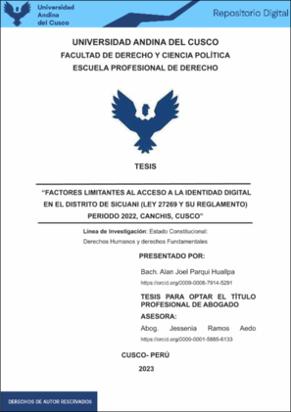| dc.contributor.advisor | Ramos Aedo, Jessenia | |
| dc.contributor.author | Parqui Huallpa, Alan Joel | |
| dc.date.accessioned | 2024-03-05T13:46:53Z | |
| dc.date.available | 2024-03-05T13:46:53Z | |
| dc.date.issued | 2023-06-30 | |
| dc.identifier.uri | https://hdl.handle.net/20.500.12557/6105 | |
| dc.description.abstract | El objetivo principal de esta investigación fue analizar los factores que limitan el
acceso a la identidad digital en el distrito de Sicuani, Perú, y proponer soluciones para reducir
las brechas digitales en este contexto. Para lograr esto, se utilizó un enfoque cualitativo y se
realizaron entrevistas a individuos para recopilar datos, los cuales fueron analizados y
presentados en forma de porcentajes. Los resultados obtenidos revelaron que la falta de
conocimiento y habilidades digitales fue identificada como el principal obstáculo para acceder
a la identidad digital. Además, se encontraron disparidades socioeconómicas significativas
que afectan la capacidad de acceso y uso de la identidad digital, así como desafíos
relacionados con la calidad de la infraestructura de telecomunicaciones y la disponibilidad de
servicios de Internet confiables. Con base en estos hallazgos, se formularon
recomendaciones clave. Se sugirió fortalecer los programas de capacitación y alfabetización
digital, implementar políticas para reducir las disparidades socioeconómicas, mejorar la
infraestructura de telecomunicaciones y fomentar la colaboración entre actores
gubernamentales, educativos y del sector privado. En general, este estudio resalta la
importancia de abordar los factores que limitan el acceso a la identidad digital y propone
medidas concretas para reducir las brechas digitales, con el objetivo de promover la inclusión
y la participación equitativa en la sociedad digital. Estas recomendaciones buscan mejorar el
acceso y uso de la identidad digital, creando así un entorno digital más inclusivo y brindando
oportunidades igualitarias para todos los individuos en el distrito de Sicuani y más allá. | es_PE |
| dc.description.abstract | Abstract
The main objective of this research was to analyze the factors that limit access to digital
identity in the district of Sicuani, Peru, and propose solutions to reduce digital gaps in this
context. To achieve this, a qualitative approach was used and interviews were conducted with
individuals to collect data, which were analyzed and presented as percentages. The results
obtained revealed that the lack of digital knowledge and skills was identified as the main
obstacle to accessing digital identity. In addition, significant socioeconomic disparities were
found that affect the ability to access and use digital identity, as well as challenges related to
the quality of the telecommunications infrastructure and the availability of reliable Internet
services. Based on these findings, key recommendations were formulated. It was suggested
to strengthen training and digital literacy programs, implement policies to reduce
socioeconomic disparities, improve telecommunications infrastructure, and foster
collaboration between government, educational, and private sector actors. In general, this
study highlights the importance of addressing the factors that limit access to digital identity
and proposes concrete measures to reduce digital divides, with the aim of promoting inclusion
and equal participation in the digital society. These recommendations seek to improve the
access and use of digital identity, thus creating a more inclusive digital environment and
providing equal opportunities for all individuals in the Sicuani district and beyond. | en_US |
| dc.format | application/pdf | es_PE |
| dc.language.iso | spa | es_PE |
| dc.publisher | Universidad Andina del Cusco | es_PE |
| dc.rights | info:eu-repo/semantics/openAccess | es_PE |
| dc.rights.uri | https://creativecommons.org/licenses/by-nc-nd/4.0/ | es_PE |
| dc.subject | Identidad digital | es_PE |
| dc.subject | Brecha digital | es_PE |
| dc.subject | Ley de certificados y firma digital | es_PE |
| dc.title | Factores limitantes al acceso a la identidad digital en el distrito de Sicuani (Ley 27269 y su reglamento) periodo 2022, Canchis, Cusco | es_PE |
| dc.type | info:eu-repo/semantics/bachelorThesis | es_PE |
| thesis.degree.name | Abogado | es_PE |
| thesis.degree.grantor | Universidad Andina del Cusco. Facultad de Derecho y Ciencia Política | es_PE |
| thesis.degree.discipline | Derecho | es_PE |
| dc.publisher.country | PE | es_PE |
| dc.subject.ocde | https://purl.org/pe-repo/ocde/ford#5.05.00 | es_PE |
| renati.advisor.dni | 40741062 | |
| renati.advisor.orcid | https://orcid.org/0000-0001-5885-6133 | es_PE |
| renati.author.dni | 41978508 | |
| renati.discipline | 421016 | es_PE |
| renati.juror | Quispe Quispe, Fredy | |
| renati.juror | Calvo Rodriguez, Yuri | |
| renati.juror | Quispe Mamani, Edyson Américo | |
| renati.level | https://purl.org/pe-repo/renati/level#tituloProfesional | es_PE |
| renati.type | https://purl.org/pe-repo/renati/type#tesis | es_PE |
| dc.description.lineadeinvestigacion | Estado Constitucional: Derechos Humanos y derechos Fundamentales | es_PE |




